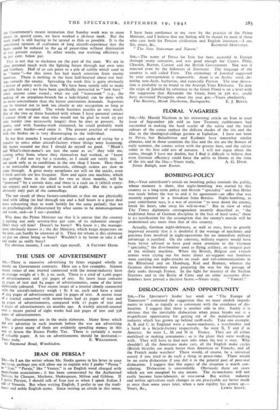BOMBING-POLICY
SIR,—Your contributor's article on bombing policy reminds the public, whose memory is short, that night-bombing was started by this country as a long-term policy and British " speciality " and that Hitler was ready before the war to end it by agreement—an offer that was recently repeated in a broadcast from Breslau. Night-bombing, as your contributor says, is a war of attrition " to wear down the enemy, break his heart, take away his will-to-war." But in view of what The Times diplomatic correspondent recently described as " the traditional force of German discipline in the face of hard tasks," there is n9 justification for the assumption that the enemy's morale will be undermined any more than that of this country.
Actually, German night-defences, as well as ours, have so greatly improved recently that it is doubtful if the wastage of machines and precious lives involved in night-operations for no immediate military advantage is justified. On the contrary, military experts would have been better advised to have paid more attention to the German " speciality," the dive-bomber used as flying artillery, an integral part of the military machine. When the British, Belgian and French armies were crying out for more direct air-support our bombers were carrying out night-attacks on road- and rail-communications in the Rhineland and on Hamburg, Kiel and Bremen, whereas the German dive-bombers were preparing the way for the passage of their tanks through France. In the fight for mastery of the Sicilian Narrows and in the Battle of Crete and on other occasions dive-
boinbers have proved a decisive factor.—Yours truly, " TARGET."


























 Previous page
Previous page